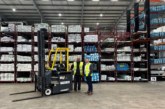
In the Viewpoint column of PBM’s April issue, editor Paul Davies referenced the magazine’s annual ‘Top 20’ countdown of the UK’s largest merchant businesses.
The centrepiece of this issue is our annual supplement detailing the performance of the UK’s Top 20 merchants (based on turnover figures), giving us reason to pause and reflect on the state of the market as a whole and the activities of the individual business within. [please see here for the more detailed web version of the story]
And revealing an ongoing trend, it is another year that shows some significant change in the ‘structure’ of the market, with private equity investment and the rapid expansion of a number of the leading businesses continuing the transformational impact of the last few years. Perhaps the most notable change is the introduction of the STARK Group into the UK, and whilst the other entries remain familiar names, just consider the simple scale and reach of some of those business to see how the market has developed.
Having adapted to the initial shock of Covid and ultimately thrived as a sector, the wider sense of post-pandemic optimism quickly gave way in early 2022 to an increasing ‘cost of living’ crisis. Early warning signs were already apparent in the economy, but the devastating events in Ukraine were compounded by considerable domestic upheaval to ensure that the last 12 months have been categorised by constrained consumer spending, a contraction in housebuilding, inflated prices, ongoing supply chain difficulties and increased business costs.
“What is fascinating to see is that whilst the end goals of delivering impeccable customer service and increasing sales are clearly common to all, the strategic approaches taken vary considerably.”
Yet against such a concerning backdrop, many of our respondents noted that the outlook was “brighter than many feared in the second half of last year” and a commitment to invest and expand remain strong among our Top 20 — even though turnover jumps are at least in part fuelled by increased prices rather than rising sales volumes.
Beyond this, many of the key themes remain unchanged — digitisation, both front of house and back office; a recruitment challenge and a skills shortage on both sides of the counter; and environmental concerns, in terms of developing a more suitable, sustainable product offering alongside improved business practices — from decarbonising transportation to solar powered branches.
What is fascinating to see is that whilst the end goals of delivering impeccable customer service and increasing sales are clearly common to all, the strategic approaches taken vary considerably. Another year down the line from the likes of TP and Saint-Gobain Building Distribution UK (as was) disposing of their ‘non-core’ plumbing & heating divisions, many leading merchant businesses are doubling down on their areas of specialist expertise.
Others, meanwhile, are seeking growth by expanding their ranges and broadening their appeal — hire services, showrooms and, increasingly, electrical wholesaling are becoming commonplace for many as they aim to become more of a ‘one stop destination’ for the trade.
Looking at the turnover figures recorded for the year, I’m stuck by the sheer size of so many businesses in the sector. We talk of nationals and independents, but is this really still the most accurate language to use? And as we speculated this time last year, IBMG’s decision to depart from NBG illustrates a developing impact on the role of the buying groups as individual scale trumps collective purchasing.
And whilst it is always tempting to consistently focus on these larger organisations, these changes also have an effect on all merchant businesses at the local level…
A final thought is on some of the ‘merchant-adjacent’ businesses that don’t feature on our countdown. The likes of Screwfix and even B&Q TradePoint continue to go from strength to strength, whilst the self-styled online builders’ merchant CMO Group and other digital players are making significant inroads into traditional merchant market spaces and can’t be ignored as the battle for custom intensifies.









